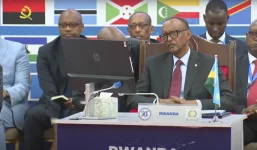Regional leaders gathered in Dar es Salaam, Tanzania, on Saturday for a crucial joint summit between the East African Community and the Southern African Development Community. The summit focused on the deteriorating security situation in eastern DR Congo.
The high-level meeting brought together numerous heads of state, including Tanzania's President Samia Suluhu Hassan, Rwanda's President Paul Kagame, Kenya's President William Ruto, Uganda's President Yoweri Museveni, Zambia's President Hakainde Hichilema, and Zimbabwe's President Emmerson Mnangagwa, who serves as SADC chairperson. Somalia's President Hassan Sheikh Mohamud attended alongside African Union Commission Chairperson Moussa Faki Mahamat and EAC Secretary General Veronica Nduva. Burundi sent Prime Minister Gervais Ndirakobuca as its representative, and DR Congo's President Félix Tshisekedi participated virtually.
President Hassan opened the proceedings by emphasizing the conflict's cross-border implications. She stressed the urgent need for African-led solutions, warning that history would judge regional leaders harshly if they failed to address the mounting crisis. Following the opening ceremony, the leaders moved into closed-door discussions.
The summit comes amid complex developments in the region's peacekeeping efforts. The East African Community deployed its regional force to eastern DR Congo in November 2022, responding to territorial gains by M23 rebels in North Kivu Province. M23 later joined the Alliance Fleuve Congo, a rebel coalition formed in Nairobi in December 2023, which advocates for improved governance and human rights.
The EAC regional force, comprising troops from Kenya, Burundi, Uganda, and South Sudan, initially succeeded in maintaining a ceasefire and securing M23's withdrawal to designated areas. However, these gains reversed after the ceasefire collapsed in October 2023. President Tshisekedi's criticism of the force and subsequent preference for SADC troops marked a turning point in regional peacekeeping efforts.
Reports emerged of SADC's mission collaborating with the Congolese army, FDLR militants, and European mercenaries against AFC/M23 rebels, further complicating the security landscape. The FDLR's continued presence remains particularly concerning, given its links to perpetrators of the 1994 Genocide against the Tutsi in Rwanda.
The EAC force withdrew in December 2023 after facing resistance from Kinshasa, which demanded direct military engagement with M23 - an action outside the force's mandate. The ongoing Nairobi peace process acknowledges the deep historical roots of eastern DR Congo's instability, dating before 1994, and recognizes how the influx of defeated genocidal forces into the region has perpetuated conflict.
The high-level meeting brought together numerous heads of state, including Tanzania's President Samia Suluhu Hassan, Rwanda's President Paul Kagame, Kenya's President William Ruto, Uganda's President Yoweri Museveni, Zambia's President Hakainde Hichilema, and Zimbabwe's President Emmerson Mnangagwa, who serves as SADC chairperson. Somalia's President Hassan Sheikh Mohamud attended alongside African Union Commission Chairperson Moussa Faki Mahamat and EAC Secretary General Veronica Nduva. Burundi sent Prime Minister Gervais Ndirakobuca as its representative, and DR Congo's President Félix Tshisekedi participated virtually.
President Hassan opened the proceedings by emphasizing the conflict's cross-border implications. She stressed the urgent need for African-led solutions, warning that history would judge regional leaders harshly if they failed to address the mounting crisis. Following the opening ceremony, the leaders moved into closed-door discussions.
The summit comes amid complex developments in the region's peacekeeping efforts. The East African Community deployed its regional force to eastern DR Congo in November 2022, responding to territorial gains by M23 rebels in North Kivu Province. M23 later joined the Alliance Fleuve Congo, a rebel coalition formed in Nairobi in December 2023, which advocates for improved governance and human rights.
The EAC regional force, comprising troops from Kenya, Burundi, Uganda, and South Sudan, initially succeeded in maintaining a ceasefire and securing M23's withdrawal to designated areas. However, these gains reversed after the ceasefire collapsed in October 2023. President Tshisekedi's criticism of the force and subsequent preference for SADC troops marked a turning point in regional peacekeeping efforts.
Reports emerged of SADC's mission collaborating with the Congolese army, FDLR militants, and European mercenaries against AFC/M23 rebels, further complicating the security landscape. The FDLR's continued presence remains particularly concerning, given its links to perpetrators of the 1994 Genocide against the Tutsi in Rwanda.
The EAC force withdrew in December 2023 after facing resistance from Kinshasa, which demanded direct military engagement with M23 - an action outside the force's mandate. The ongoing Nairobi peace process acknowledges the deep historical roots of eastern DR Congo's instability, dating before 1994, and recognizes how the influx of defeated genocidal forces into the region has perpetuated conflict.












